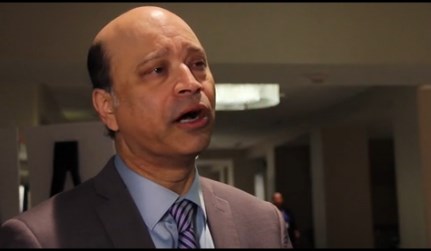User login
MIAMI BEACH – Breast tumors positive for the human epidermal growth factor receptor-2 (HER2) comprise only about 20% of all breast cancers, but for patients with HER2-positive disease, neoadjuvant therapy with trastuzumab (Herceptin) was and is a game changer, improving pathological complete response rates and long-term disease-free and overall survival rates, Debu Tripathy, MD, said at the annual Miami Breast Cancer Conference, held by Physicians’ Education Resource.
In the nearly 2 decades that have passed since the approval of trastuzumab, clinicians have learned how best to use HER2 inhibitors, how to weigh the relative risks and benefits of anti-HER2 therapy in patients who may be at risk for cardiotoxicities such as heart failure, and what combination regimens work best with HER2 inhibitors in early-stage disease.
In a video interview, Dr. Tripathy, professor and chair of the department of breast medical oncology at the University of Texas MD Anderson Cancer Center in Houston, discusses current clinical considerations for the use of trastuzumab and pertuzumab (Perjeta) in the neoadjuvant and adjuvant settings, investigational targeted therapies and immunotherapeutic strategies, and recently released clinical trial data showing a significant increase in disease-free survival for patients treated with dual HER2-blockade compared with HER2 monotherapy.
The video associated with this article is no longer available on this site. Please view all of our videos on the MDedge YouTube channel
Dr. Tripathy disclosed research/grant support from Novartis, and consulting for Nektar, Novartis, and Puma Biotechnology.
MIAMI BEACH – Breast tumors positive for the human epidermal growth factor receptor-2 (HER2) comprise only about 20% of all breast cancers, but for patients with HER2-positive disease, neoadjuvant therapy with trastuzumab (Herceptin) was and is a game changer, improving pathological complete response rates and long-term disease-free and overall survival rates, Debu Tripathy, MD, said at the annual Miami Breast Cancer Conference, held by Physicians’ Education Resource.
In the nearly 2 decades that have passed since the approval of trastuzumab, clinicians have learned how best to use HER2 inhibitors, how to weigh the relative risks and benefits of anti-HER2 therapy in patients who may be at risk for cardiotoxicities such as heart failure, and what combination regimens work best with HER2 inhibitors in early-stage disease.
In a video interview, Dr. Tripathy, professor and chair of the department of breast medical oncology at the University of Texas MD Anderson Cancer Center in Houston, discusses current clinical considerations for the use of trastuzumab and pertuzumab (Perjeta) in the neoadjuvant and adjuvant settings, investigational targeted therapies and immunotherapeutic strategies, and recently released clinical trial data showing a significant increase in disease-free survival for patients treated with dual HER2-blockade compared with HER2 monotherapy.
The video associated with this article is no longer available on this site. Please view all of our videos on the MDedge YouTube channel
Dr. Tripathy disclosed research/grant support from Novartis, and consulting for Nektar, Novartis, and Puma Biotechnology.
MIAMI BEACH – Breast tumors positive for the human epidermal growth factor receptor-2 (HER2) comprise only about 20% of all breast cancers, but for patients with HER2-positive disease, neoadjuvant therapy with trastuzumab (Herceptin) was and is a game changer, improving pathological complete response rates and long-term disease-free and overall survival rates, Debu Tripathy, MD, said at the annual Miami Breast Cancer Conference, held by Physicians’ Education Resource.
In the nearly 2 decades that have passed since the approval of trastuzumab, clinicians have learned how best to use HER2 inhibitors, how to weigh the relative risks and benefits of anti-HER2 therapy in patients who may be at risk for cardiotoxicities such as heart failure, and what combination regimens work best with HER2 inhibitors in early-stage disease.
In a video interview, Dr. Tripathy, professor and chair of the department of breast medical oncology at the University of Texas MD Anderson Cancer Center in Houston, discusses current clinical considerations for the use of trastuzumab and pertuzumab (Perjeta) in the neoadjuvant and adjuvant settings, investigational targeted therapies and immunotherapeutic strategies, and recently released clinical trial data showing a significant increase in disease-free survival for patients treated with dual HER2-blockade compared with HER2 monotherapy.
The video associated with this article is no longer available on this site. Please view all of our videos on the MDedge YouTube channel
Dr. Tripathy disclosed research/grant support from Novartis, and consulting for Nektar, Novartis, and Puma Biotechnology.
AT MBCC
